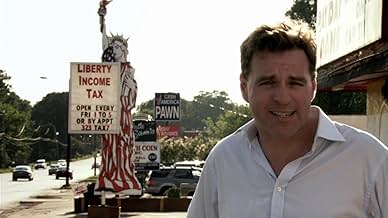Niall Ferguson te lleva en una aventura histórica a través del ascenso del dinero, aplicando hechos y opiniones en todo momento.Niall Ferguson te lleva en una aventura histórica a través del ascenso del dinero, aplicando hechos y opiniones en todo momento.Niall Ferguson te lleva en una aventura histórica a través del ascenso del dinero, aplicando hechos y opiniones en todo momento.
- Reparto principal
- Premios
- 1 premio en total
Explorar episodios
Argumento
¿Sabías que...?
- ConexionesEdited into The Ascent of Money (2009)
Reseña destacada
Ferguson is good, very good at times. I have read several of his books and now I just watched this 6 episode TV series, "The Ascent of Money". There has been good and longer reviews in the NY Times and Guardian newspapers. Here are just some quick critical points:
1. You get the impression that all economic inventions (Smith, Law, Mattesson etc.) come from Scotland, which is at least somewhat of an exaggeration (Ferguson's home country)
2. Ferguson gives much time to one economist, Milton Friedman, but without much critique. Maybe he should not have worked for Pinochet, but in the long run it was good, Ferguson concludes. Allende is presented as a bad economist, a simple Marxist, nothing about US involvement in the coup.
3. There is no "too big to fail", no critique of the big banks, no critique of how banks control American politics through donations. George Soros get criticized, as a representative of Hedge Funds, but that is it.
4. Ferguson is jumping back and forth without reaching convincing conclusions in each part. Ex. The jump from history of money to insurance.
5. The presentation of the history of the welfare state is strange to say the least, grabbing on to one example, the Japanese, without discussion or even mentioning the start in Germany of the spread to Scandinavia.
6. You get the impression Ferguson is too fond of the wealthy, ex. Ken Griffin. In interviews with them we are very far away from "Hard Talk".
7. It is "the market which has gone mad" not individuals, not manipulators, not bad companies, with one exception, Enron. You get the impression Ferguson only attacks those who already lay down, or who have fallen.
8. "Chimerica" as explained by Ferguson does not really explain anything, it at the most a catchy word. Indeed he goes far to destroy it himself at the end.
It's a good series overall, but there are at the same time too many troublesome interpretations, strange selections and too much support of globalization and American status quo for it to be truly insightful.
1. You get the impression that all economic inventions (Smith, Law, Mattesson etc.) come from Scotland, which is at least somewhat of an exaggeration (Ferguson's home country)
2. Ferguson gives much time to one economist, Milton Friedman, but without much critique. Maybe he should not have worked for Pinochet, but in the long run it was good, Ferguson concludes. Allende is presented as a bad economist, a simple Marxist, nothing about US involvement in the coup.
3. There is no "too big to fail", no critique of the big banks, no critique of how banks control American politics through donations. George Soros get criticized, as a representative of Hedge Funds, but that is it.
4. Ferguson is jumping back and forth without reaching convincing conclusions in each part. Ex. The jump from history of money to insurance.
5. The presentation of the history of the welfare state is strange to say the least, grabbing on to one example, the Japanese, without discussion or even mentioning the start in Germany of the spread to Scandinavia.
6. You get the impression Ferguson is too fond of the wealthy, ex. Ken Griffin. In interviews with them we are very far away from "Hard Talk".
7. It is "the market which has gone mad" not individuals, not manipulators, not bad companies, with one exception, Enron. You get the impression Ferguson only attacks those who already lay down, or who have fallen.
8. "Chimerica" as explained by Ferguson does not really explain anything, it at the most a catchy word. Indeed he goes far to destroy it himself at the end.
It's a good series overall, but there are at the same time too many troublesome interpretations, strange selections and too much support of globalization and American status quo for it to be truly insightful.
- kss-3
- 8 nov 2014
- Enlace permanente
Selecciones populares
Inicia sesión para calificar y añadir a tu lista para recibir recomendaciones personalizadas
- How many seasons does The Ascent of Money have?Con tecnología de Alexa
Detalles
- Duración2 horas
- Color
Contribuir a esta página
Sugerir un cambio o añadir el contenido que falta

Principal laguna de datos
By what name was The Ascent of Money (2008) officially released in Canada in English?
Responde


















